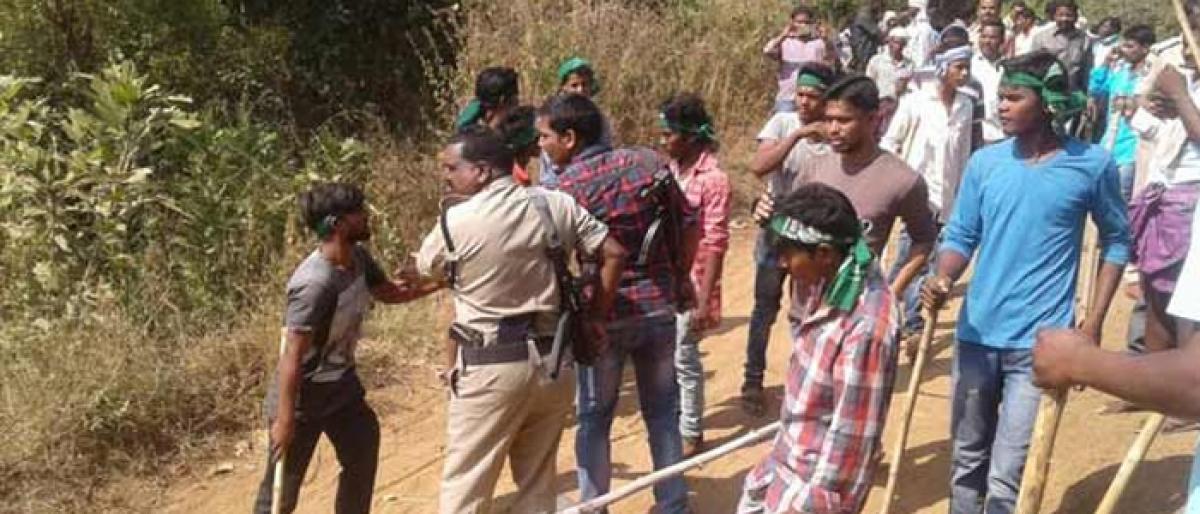Why tribals growing restive in Telangana

Seeds of unrest seem to have been sown in the very process of AP State reorganisation, as tribal interests were not viewed as equally important and on a par with those of other sections of Telangana society. Bifurcation resulted in a large chunk of tribal area of Telangana coming under submergence of the controversial Polavaram Dam transferred to Andhra Pradesh.
Seeds of unrest seem to have been sown in the very process of AP State reorganisation, as tribal interests were not viewed as equally important and on a par with those of other sections of Telangana society. Bifurcation resulted in a large chunk of tribal area of Telangana coming under submergence of the controversial Polavaram Dam transferred to Andhra Pradesh. Tribal groups feel the bargain for the new state of Telangana was achieved by ‘sacrificing’ tribal interests. Subsequently, a series of measures by the Telangana government only helped in adding salt to the injury.
Opportunities of supporting long-time demand of strengthening tribal identity and self-rule by bringing together contiguous areas of tribal pockets into new exclusive tribal districts were lost during the reorganisation of districts. Instead, the old tribal areas were divided into multiple smaller tribal islands into more non-tribal districts. Appointing Chellappa Commission in March 2015 to examine inclusion of Khaithi Lambada and Valmiki Boya into ST communities in Telangana is yet another reason for tribal disenchantment with the government.
Many other moves of the Telangana government directly affecting administration of the tribal areas or indirectly affecting land and forest laws of Scheduled Areas have become bones of contention resulting in state-wide tribal unrest. Omissions and commissions of the TRS government affecting adversely the Tribal Administration have further led to the current turmoil, reflected in the form of recent violent clashes between Lambadas and non-Lambadas in Adilabad district as well as the agitation for tribal self-rule across the state.
Much applauded land and forest-related programmes of the government like Haritha Haram plantation programme, Regularisation of Sada Bainama land transactions, Bhu Prakshalana updation of land records, Rythu Bandhu financial assistance to famers, etc., seem to only further push the tribals onto the warpath in the new state.
Unlike land tenure systems in neighbouring Andhra Pradesh State, land tenures prevailing in the Scheduled Areas of Telangana State are contentious and disputed. The successive governments of united Andhra Pradesh and the present government have failed to implement effectively the tribal protective Land Transfer Regulations 1 of 59 as amended by 1 of 70 to liberate illegally held lands from the clutches of mainland non-tribals.
Any attempt of regularisation of government lands in favour of non-tribals in the scheduled tracts is completely banned as per the ruling of Supreme Court in Samata Case in 1997. It is a known fact that most of the non-tribal land occupants have managed to get the land surveyed in their favour during the survey and settlement operations held in 1970-76. The subsequent amendment of Record of Rights Act 1989 (RoR) further helped most of the non-tribal illegal occupants create antedated unregistered sale papers to escape from the clutches of LTR 1 of 70, despite an in-built tribal protective land clause in the legislation.
The present government is found fault with for initiating a few deliberate anti-tribal moves in violation of Koneru Land Committee recommendations, the tribal protective LTR 1 of 70 and PESA Act – initially denying forest land claims under the Recognition of Forest Rights Act 2006, dispossessing thousands of adivasis from Kawal Tiger Reserve and Amrabad Tiger Reserve in 2015 and forcibly relocate them without recognizing their forest land rights under the Recognition of Forest Rights Act 2006, and “Haritha Haram” massive plantation program becoming yet another tool to evict tribals from the forest lands in their occupation.
A futile bid was also made in 2017 even to replace the existing agency courts legal system with the Judicial Courts vide Memo (No 24196/2017 Revenue Department), giving authority to District Collectors for regularisation of land transfers effected between the parties on assigned lands.
Regularising land transfers based on ‘Sada Bainama’ (transfers effected on unregistered plain papers), initiated in 2016, actually became perilous as it offered a golden opportunity for unscrupulous non-tribals to create antedated documents to get legitimacy over the illegally held tribal lands.
The comprehensive land survey programme projected as community-driven land records updation reform, initiated in 2017 through Rythu Samanvaya Samithis formed by the Agriculture Department, as a parallel structure to constitutional body of Gram Sabha, is also manipulated by non-tribals to secure legitimacy over illegally held land holdings.
The tribal activists of Gondwana Samkshema Parishad, Tudum Debba, Gondwana Vidyarthi Parishad, Adivasi Chaitanya Sena complain that thousands of acres of tribals in Venkatapuram, Wazeedu etc., mandals in Jayashankar Bhupalapalli were updated in the name of non-tribals on the pretext that documents did not exist for public scrutiny. Tribal activists allege that officials literally destroyed old records recently in many mandals by burning and tearing the documents.
A large number of non-tribals managed to become first beneficiaries to receive cheques under Rythu Bandhu programme, while the tribals are in the waiting list. Non-tribals have also managed to receive patta in assigned land. Similarly, thousands of acres of government lands in Bhadradri Kothagudem Districts got updated in the name of non-tribals.
By: Palla Trinadha Rao & Mamidi Bharath Bhushan








